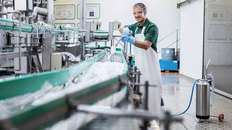- Production capacity for methane sulfonic acid will increase by 65%.
- Global capacity will reach 50,000 metric tons per year.
- Additional volumes will be available late in 2021.
- Expansion supports rapid growth, especially in Asia.

Expansion of Production Capacity
BASF plans to expand its production capacity for methane sulfonic acid (MSA) at the Ludwigshafen site by approximately 65%, increasing global capacity to 50,000 metric tons per year. The additional capacity is expected to be available by late 2021, catering to customers in all regions.
Rising Demand and Strategic Growth
The demand for MSA has surged across various industries, prompting this expansion to support the rapid growth of customers, particularly in Asia. BASF is also evaluating investment options outside of Europe to further expand MSA capacities.
Sustainable Alternative
Methane sulfonic acid is a strong organic acid used in applications such as chemical and biofuel synthesis, industrial cleaning, and metal surface treatment in the electronics industry. The expansion aligns with the trend towards high-performance and environmentally friendly technologies.
Product Benefits
BASF’s proprietary process produces Lutropur® MSA, a high-purity methane sulfonic acid that serves as a sustainable alternative to other acids like sulfuric, phosphoric, or acetic acid. MSA is readily biodegradable as part of the natural sulfur cycle and offers practical benefits such as non-oxidizing nature, high solubility of its salts, and absence of color and odor.

